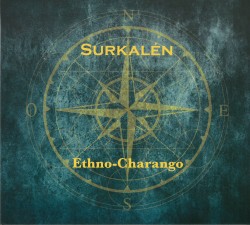 Ethno-Charango
Ethno-Charango
Surkalén
Independent (surkalen.ca)
Review
Surkalén is a Quebec quartet of relatively recent vintage, which identifies its music as “ethno-fusion.” Three members of the band are Chileans who met in 2006 in Montreal. Claudio Rojas plays plucked strings, flutes and electric bass, the vocalist Sanda Ulloa also specializes on cuatro and percussion, while bass player Rony Dávila also plays guitar, cuatro and flutes. In 2009 the Russian-Canadian violinist Maria Demacheva joined them and Surkalén was born.
The album title refers to the charango, a small guitar-like instrument of the Andes, whose sound permeates the entire album. As the group explains it, their name is derived from several languages. The “Sur” stands for their South American birthplaces, and “kalén” means “different” in the Selk’nam language of the indigenous people of the Patagonian region of southern Argentina and Chile, a culture referenced on the last track.
While their geographies of origin define a significant part of their work here (particularly that of South America), Surkalén also embraces musical features of Europe, Africa, North India and the Middle East. These manifold transcontinental influences are at times startling, if not jarring, in their superimposition. For example the work Patagonia…, which at its core is almost new-age-y in its violin-led lyricism – played by Demacheva, who exhibits beautiful, secure classically-trained tone – is at one point disturbed by an aggressive rock-like fuzz-toned electric bass solo.
After repeated listing, it seems to me that despite referencing multiple geographically diverse musical performance aesthetic sources, Surkalén’s unifying feature is best characterized as a mix of vernacular music vocabularies and contemporary popular music studio values. It’s that approachable quality which probably accounts for most of the group’s warm reception and popular success.
Concert Note: Surkalén presents "Ethno-Charango" on March 20 at Salle Claude-Léveillée Place des arts in Montreal.



